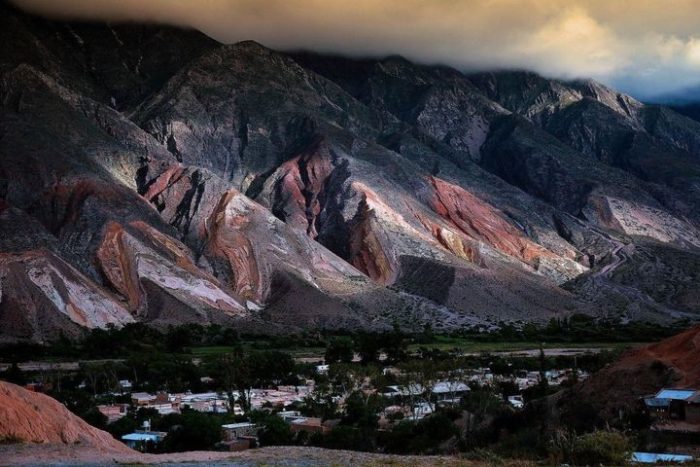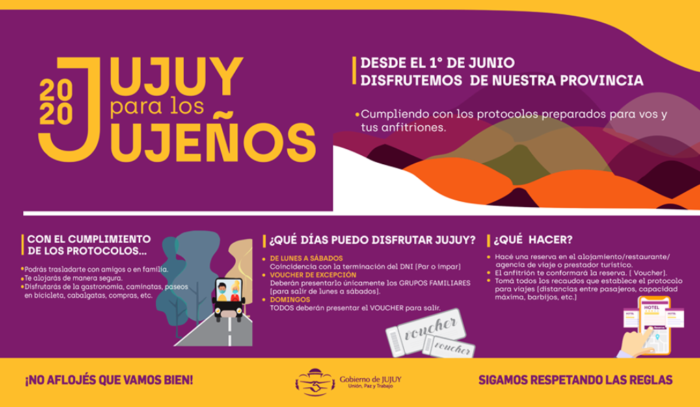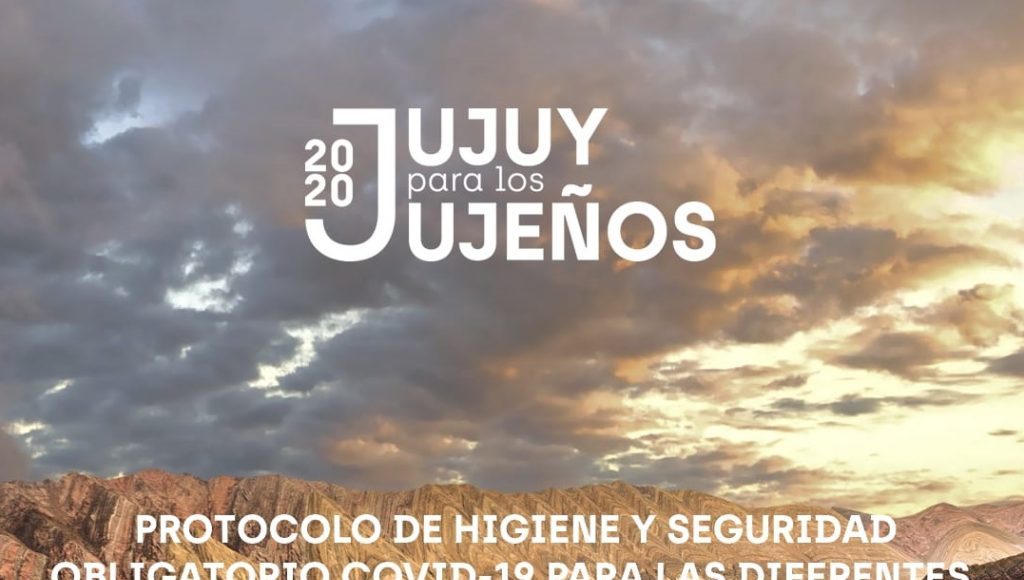As large parts of the country remain in lockdown, Argentina’s northernmost province, Jujuy, has all but ended its quarantine amid harsh restrictions on freedoms.
Main image (above): Hygiene and Safety Protocol. Obligatory during Covid-19 for all activities in the tourist sector. May 2020
As provincial tourism has restarted under the initiative “Jujuy para Los Jujeños, the provincial governor, Gerardo Morales, has proudly declared “the whole country is watching us”. However, measures taken to contain the virus’ spread have been met with criticism as both their reasonableness and legality have been called into question.
Nestled between the province of Salta to its south and east, Bolivia to the north, and Chile to its west, Jujuy, with a population of just over 700,000, has so far registered just 7 cases (of a total 17,415 in Argentina).

As the province has accumulated more days without new cases, it has cautiously begun reopening activities. Jujuy was the first province to allow outdoor exercise, and reopen local businesses such as shopping centres, hairdressers and restaurants. With tourism restarting for resident Jujeños, the Morales-led government here has successfully contained the virus and restarted economic activity in the province.

To reach this stage the provincial government has acted forcefully in imposing the quarantine and sealing the province’s borders, whilst increasing its control over the internal movement of people.
Strict enforcement and monitoring
The provincial government has imposed heavy penalties for those deemed to have not complied with restrictions on movement, with large numbers of people being detained, and others handed punitive fines of up to 340,000 pesos (equivalent to around US$5,000).
Aside from legal deterrents, Radical Party provincial governor Gerardo Morales has attempted to deepen social control by encouraging citizens to discipline one another by suggesting he would put a ‘security belt’ around the houses of those who have coronavirus so that the neighbourhood knows ‘that family is under quarantine and if they go out they could infect someone.’

These comments were widely condemned, with Liliana Fellner, the Peronist-aligned National Representative for Jujuy describing it as an attempt ‘to sow fear in the population’ as a way ‘to return to imposing authoritarianism’.
In response to the fallout surrounding the comments, Morales later apologised for using the phrase “security belts on houses” and has sought to distance himself from any attempt at ‘stigmatization’ of those who have coronavirus.
In a further attempt to control people’s movement, plans have also been announced to launch the contact tracing app “SIMMOV”. The app works by scanning individuals’ identity documents when they travel along main roads, enter shops, restaurants and hotels. If a case of coronavirus is reported, anyone who may have been in contact with that person can be identified through the app and notified.
As individuals are required by a new decree (Ley No.6168) to present their identity documents on request by a police officer or appointed official, people have asked whether this includes having their documents scanned and data on their movements stored. An injunction has been filed at the Supreme Court of Jujuy by a provincial legislator, Martin Palmieri, seeking to have the decree ruled unconstitutional on the basis that it contravenes a federal law protecting personal data (Ley No.25,326).
Whilst the provincial government has sought to provide assurances that individuals will not be required to have their document scanned, doubts remain as to how people will be made aware of their right to withhold consent and, if they choose to provide information, how the authorities will ensure confidentiality.
Border controls
The provincial government took severe measures to secure Jujuy’s borders to prevent contagion. For example, at the start of April, 62 people from various Latin America countries were deported from the province and put on a bus to Buenos Aires.
Jujuy’s actions resulted in a number of civil rights organizations in Argentina such as CELS (Centro de Estudios Legales y Sociales) presenting a defence of Habeas Corpus on behalf of 40 of the immigrants to the Federal Court of Jujuy, on the basis that the deportation constituted ‘a concrete and real threat of abridgement of freedom of movement’ as many of the passengers were deemed to have boarded the bus against their will. The government defended its actions claiming that all the passengers were attempting to return home.
In addition, a decree (NO. 944 – G/2020) implemented on 24 May imposes a fine of up to 340,000 pesos (around US$5,000) for any non-Argentine citizen who attempts either to enter or travel within the province without being able to certify legal residency there.
This decree is clearly designed to further deter any movement between the towns of La Quiaca (Argentina) and Villazon (Bolivia) in what is an important transit route both economically and culturally for people on both sides of the border.
This has resulted in large numbers of Bolivians being deported from Jujuy, accused of breaking the quarantine by evading border controls in order to collect social security payments in La Quiaca with false residency papers.
Widespread support
Despite these criticisms, the Jujuy government has consistently measured itself by its ability to contain the spread of the virus and restart the province’s economy.
By increasing its rapid testing capacity the provincial government has been able to carry out extensive testing of truck drivers delivering goods at Jujuy’s border with Salta, so far successfully closing off an obvious entry route for the virus.
These measures have also bought the provincial government time to strengthen the province’s health care system. To this effect, a new campaign hospital has been built in the capital city, San Salvador, and Jujuy’s limited healthcare resources have been reorganized in anticipation of an outbreak of the virus.
With very few cases, and not a single death, the provincial government deserves credit for stopping the virus’ spread. This is certainly reflected in the views of the vast majority of people in Jujuy, with 95 per cent either having ‘some’ or ‘a lot’ of confidence in the measures taken to confront the pandemic according to a recent poll conducted by La Defensoria de Jujuy.
While both the federal government and a number of provincial governors look for ways to safely lift what has been one of the longest quarantines in the world, Morales is no doubt right when he claims ‘the whole country is watching’. However, with concerns remaining that the provincial government is reintroducing certain freedoms whilst unjustifiably restricting them elsewhere, the attention may not be for the reasons he intended.

